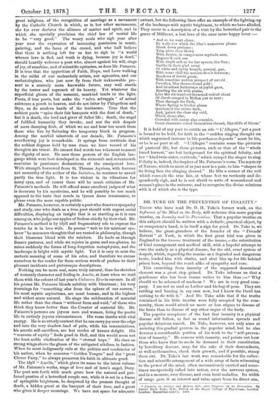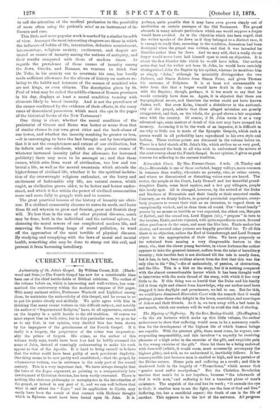DR. TUKE ON THE PREVENTION OF INSANITY.*
THOSE who have read Dr. D. H. Tuke's former work, on the influence of the Mind on the Body, will welcome this more popular treatise, on insanity and its Prevention. That a popular treatise on
this subject should be written with a definite, practical object, by so competent a hand, is in itself a sign for good. Dr. Tuke is, we believe, the great-grandson of the founder of the "Friends'
Retreat" at York, in which the first great trial was given in England to the humane treatment of the insane,—the substitution
of kind management and medical skill, with a hopeful attempt to cure the malady as a physical disease, for the old, cruel system of despair, which, regarding the maniac as a degraded and dangerous brute, loaded him with chains, and shut him up for life behind prison bars, beyond the reach alike of sympathy and cure.
This exorcising from insanity of the supposed demoniacal element was a great step gained. Dr. Tuke informs us that a
gentleman who has been insane writes to him thus :—" Why should we be ashamed of madness ? We are in very good com- pany. I am not so mad as Luther and his bag of peas. They are rattling and buzzing in my ears now, but I know the Devil has nothing to do with it." And Dr. Tuke adds that if the truths contained in his little treatise were fully accepted by the com- munity, there would attach no more or less stigma to disease of the brain than to disease of any other organ of the body.
The popular acceptance of the fact that insanity is a physical disease will follow, as fast as sound information spreads and popular delusions vanish. Dr. Tuke, however, not only aims at assisting this gradual process in the popular mind, but he also devotes a considerable portion of his work to the "self-preven- tion of insanity." He reasons with insanity, and points out how those who know that its seeds lie dormant in their constitution by hereditary descent, may, for the sake of their descendants, as well as themselves, check their growth, and if possible, stamp them out. Dr. Tuke's last work was remarkable for the collec- tion and scientific arrangement of a wide array of facts witnessing to the power of the mind, often unconsciously exerted and some- times unexpectedly called into action, over the nervous system, and in a measure, over disease, and even local maladies. Its width of range gave it an interest and value apart from its direct aim,
Insanity in Ancient and Modern Life, with Chapters on its Prevention. By Daniel Hack Take, M.D., Fellow of the Hoye] College of Phyelclane, London London: Macmillan and Co. 1878.
to call the attention of the medical profession to the possibility of more often using the patient's mind as an instrument of in- fluence and cure.
This little and more popular work is marked by a similar breadth of view. Amongst the most interesting chapters are those in which the influence of habits of life, intoxication, defective nourishment, intermarriage, religious anxiety, excitement, and despair are traced as causes of insanity among the nations of antiquity, and their results compared with those of modern times. As regards the prevalence of these causes of insanity among the Jews, Greeks, and Romans, we venture to think that Dr. Tuke, in his anxiety not to overstate his case, has hardly made sufficient allowance for the silence of history on matters re- lating to the habits and interests of the masses of mankind who are not kings, or even citizens. The description given by St. Paul of what may be called the middle-classes of Roman provinces in his day, displays at least a moral condition teeming with elements likely to breed insanity. And is not the prevalence of the causes confirmed by the evidence of their effects, in the many Cases of demoniacal possession which meet the eye in the pages of the historical books of the New Testament?
One thing is clear, whether the moral condition of the proletariat of Greece and Rome was better or worse than that of similar classes in our own great cities and the back-slums of our towns, and whether the insanity resulting be greater or less, —it is encouraging to have the fact brought out by investigation that it is not the completeness and extent of our civilisation, but its defects and one sidedness, which are the potent causes of whatever increased insanity (after due allowance for increased publicity) there may seem to be amongst us ; and that these causes, which arise from want of civilisation, too low and too brutal a life, as well as the mental overstrain which attends the higher forms of civilised life, whether it be the spiritual inebria- tion of the overwrought religious enthusiast, or the hurry and excitement of fashionable city life, are natural causes, which ought, as civilisation grows older, to be better and better under- stood, and which it lies within the power of civilised communities more and more fully to grapple with and to remove.
The great practical lessons of the history of insanity are obvi- ous. If a civilised community chooses to nurse its seeds, and leave them fit soil wherein to grow and flourish, grow and flourish they will. No less than in the case of other physical diseases, much may be done, both in the individual and the national sphere, by cleansing the moral sewers of our complicated modern life, and removing the fermenting heaps of moral pollution, to ward off the approaches of the most terrible of physical diseases. By studying and complying with the laws of moral and mental health, something also may be done to stamp out this evil, and prevent it from becoming hereditary.



































 Previous page
Previous page